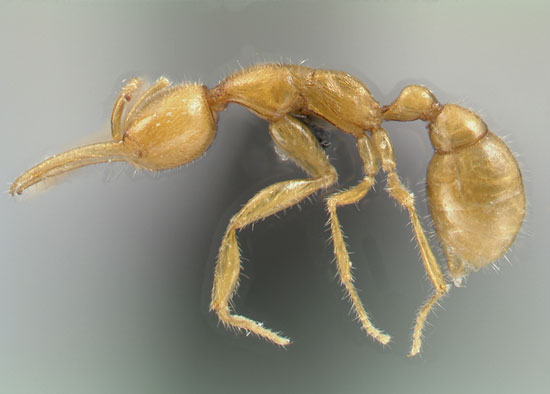Strange 'Ant from Mars' Discovered

A newly discovered species of a blind, subterranean predator — dubbed the "Ant from Mars" — is likely a descendant of one of the very first ants to evolve on Earth, a new study finds.
Christian Rabeling, an evolutionary biology graduate student at the University of Texas at Austin, found the only known specimen of the new ant species in dead plant material on the ground in the Amazon rainforest at the Empresa Brasileira de Pesquisa Agropecuaria in Manaus, Brazil, in 2003.
Rabeling and his colleagues named the ant Martialis heureka ("ant from Mars") because they'd never seen an ant like it before.
The ant is well-adapted for its underground home, with a long, pale body and no eyes. It also has long, slender forceps-like mandibles that researchers suspect the ant uses to capture prey.
M. heureka not only constitutes a new species, but a new genus and subfamily of ants as well. The new subfamily, one of 21 ant subfamilies, is the first new one to be named by scientists since 1967.
Rabeling says the discovery, detailed in the Sept. 15 issue of the journal Proceedings of the National Academy of Sciences, will help biologists better understand the biodiversity and evolution of ants.
Ants evolved more than 120 million years ago from wasp ancestors. Scientists think that ants evolved quickly into many different lineages, specializing to live in the soil, leaf-litter or trees, or in multiple habitats.
Sign up for the Live Science daily newsletter now
Get the world’s most fascinating discoveries delivered straight to your inbox.
DNA taken from the M. heureka specimen's leg indicates that it belongs at the base of the ant evolutionary tree.
"This discovery lends support to the idea that blind, subterranean predator ants arose at the dawn of ant evolution," Rabeling said.
This doesn't mean that the ancestor to all ants was blind and lived underground, but that these features evolved early in ant history and persisted in the environmentally stable soils of the tropics.
The finding of M. heureka "hints at a wealth of species, possibly of great evolutionary importance, still hidden in the soils of the remaining rainforests," the authors of the study wrote.
- Why Ants Rule the World
- What is it Like to Be an Ant?
- Images: Ants of the World

Andrea Thompson is an associate editor at Scientific American, where she covers sustainability, energy and the environment. Prior to that, she was a senior writer covering climate science at Climate Central and a reporter and editor at Live Science, where she primarily covered Earth science and the environment. She holds a graduate degree in science health and environmental reporting from New York University, as well as a bachelor of science and and masters of science in atmospheric chemistry from the Georgia Institute of Technology.









